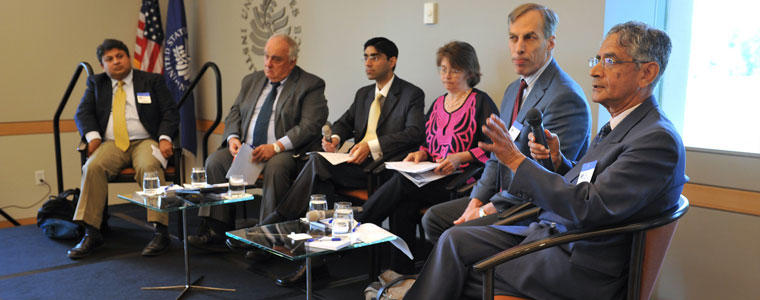India and Pakistan in Afghanistan: the 2014 Regional Outlook
Among regional actors, Pakistan is always highlighted as the most critical player in a sustainable peace in Afghanistan, yet prolonged tensions in the Pakistan-U.S. relationship and Pakistan’s worries about India’s role in Afghanistan make this a challenging issue to resolve. On May 18, USIP hosted a debate among eminent South Asia experts on Pakistani and Indian interests and strategies toward Afghanistan. The participants focused on how Islamabad and New Delhi are viewing developments in Afghanistan, the state of the Pakistan-India relationship, the impact of Pakistan-U.S. tensions on regional strategic outlooks, and how political changes within Pakistan and India may affect their strategies.

In recent months, USIP has focused on the impending transition in Afghanistan, including a focus on the role of regional actors in Afghanistan’s future. The year 2014 signifies security and political transitions in Afghanistan and the recently finalized U.S.-Afghanistan Strategic Partnership agreement signals Washington’s long-term commitment to Afghanistan beyond this deadline. However, a regional understanding on Afghanistan still remains elusive.
Among regional actors, Pakistan is always highlighted as the most critical player in a sustainable regional peace. And while the importance of addressing Pakistan’s concerns is well understood, prolonged tensions in the Pakistan-U.S. relationship and Pakistan’s worries about India’s role in Afghanistan make this a challenging issue to resolve. Nonetheless, it is well understood that a failure to incentivize peaceful Pakistani and Indian coexistence in Afghanistan will be detrimental to Afghanistan’s future.
On May 18, USIP hosted a debate among eminent South Asia experts on Pakistani and Indian interests and strategies toward Afghanistan. The participants focused on how Islamabad and New Delhi are viewing developments in Afghanistan, the state of the Pakistan-India relationship, the impact of Pakistan-U.S. tensions on regional strategic outlooks, and how political changes within Pakistan and India may affect their strategies.
This event featured the following speakers:
- Pamela Constable, panelist
Staff Writer, The Washington Post
Author, "Playing with Fire: Pakistan at War with Itself" - Sunil Dasgupta, panelist
Director, Political Science Program
University of Maryland, Baltimore County at Shady Grove - Dr. John Echeverri-Gent, panelist
Associate Professor, Department of Politics
University of Virginia - Ambassador Touqir Hussain, panelist
Adjunct Professor, Asian Studies Program
Georgetown University - Paolo Cotta-Ramusino, panelist
Secretary General
Pugwash Conferences on Science and World Affairs - Moeed Yusuf, moderator
South Asia Adviser
United States Institute of Peace
Explore Further
- Learn more about USIP's work in Pakistan
- Learn more about USIP's work in Afghanistan
- Read the Peacebrief, "Myths and Misconceptions about the Afghan Transition"
- Read the News Feature, "Finding a Regional Solution for Afghanistan"
- Read the Peacebrief, "Pakistan, the United States and the End Game in Afghanistan: Perceptions of Pakistan's Foreign Policy Elite"
- Read the News Feature, "Head of the Secretariat for Afghanistan's High Peace Council Visits USIP"
- Read the Peacebrief, "Paying for Afghanistan's Security Forces During Transition: Issues for Chicago and Beyond"
Related Academy Courses
- Supporting Police Reform: Capacity Building for Advisers and Trainers
- Negotiations from Checkpoints to High Politics
- Pilot: Cultural Adaptability: Advanced Applications



